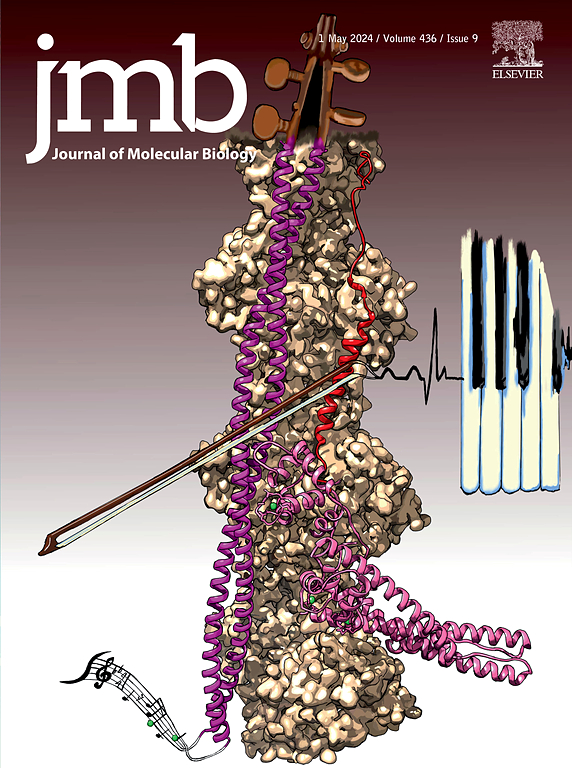PLK4 Homodimerization is Required for CEP152 Centrosome Localization and Spindle Organization
IF 4.7
2区 生物学
Q1 BIOCHEMISTRY & MOLECULAR BIOLOGY
引用次数: 0
Abstract
The centrosome-specific Polo-Like Kinase 4 (PLK4) is a unique serine/threonine kinase family member that homodimerizes using its cryptic polo-box (CPB) region. PLK4 homodimerization causes transphosphorylation, which activates its ubiquitin-mediated degradation. The same CPB interacts with upstream centrosome recruiters, CEP152 and CEP192 in human cells. However, the involvement of PLK4 homodimerization with the CEP192-CEP152 network remains unexplored. This work identified a cancerous PLK4 variant, which truncated the protein to disrupt the CPB at 774 residue. The truncated PLK4 is unable to homodimerize or interact with CEP152 or CEP192. During the S-phase, CEP152 recruits PLK4 to centrosomes, and the homodimerization of PLK4 is needed to maintain CEP152 at centrosomes. The reduction in levels of CEP152 on PLK4 homodimerization mutant expression correlates to pericentrin at S-phase centrosomes, which causes unfocussed spindles at the M-phase and reduces cell viability. The work shows a cross-dependency between CEP152 and PLK4 homodimerization for centrosome functioning, which is disrupted in cancer.

PLK4同二聚化是CEP152中心体定位和纺锤体组织所必需的
中心体特异性polo样激酶4 (PLK4)是一种独特的丝氨酸/苏氨酸激酶家族成员,通过其隐polo盒(CPB)区域进行二聚。PLK4同二聚化引起转磷酸化,从而激活其泛素介导的降解。在人类细胞中,相同的CPB与上游中心体招募体CEP152和CEP192相互作用。然而,PLK4同二聚化与CEP192-CEP152网络的关系尚不清楚。这项工作发现了一种癌变的PLK4变体,它截断该蛋白以破坏CPB的774个残基。截断的PLK4不能同二聚体或与CEP152或CEP192相互作用。在s期,CEP152将PLK4招募到中心体,并且需要PLK4的同二聚化来维持CEP152在中心体中的作用。PLK4同源二聚化突变体表达中CEP152水平的降低与s期中心体的中心蛋白相关,这导致m期纺锤体不聚焦并降低细胞活力。这项研究表明,CEP152和PLK4二聚体在中心体功能上存在交叉依赖性,而中心体功能在癌症中被破坏。
本文章由计算机程序翻译,如有差异,请以英文原文为准。
求助全文
约1分钟内获得全文
求助全文
来源期刊

Journal of Molecular Biology
生物-生化与分子生物学
CiteScore
11.30
自引率
1.80%
发文量
412
审稿时长
28 days
期刊介绍:
Journal of Molecular Biology (JMB) provides high quality, comprehensive and broad coverage in all areas of molecular biology. The journal publishes original scientific research papers that provide mechanistic and functional insights and report a significant advance to the field. The journal encourages the submission of multidisciplinary studies that use complementary experimental and computational approaches to address challenging biological questions.
Research areas include but are not limited to: Biomolecular interactions, signaling networks, systems biology; Cell cycle, cell growth, cell differentiation; Cell death, autophagy; Cell signaling and regulation; Chemical biology; Computational biology, in combination with experimental studies; DNA replication, repair, and recombination; Development, regenerative biology, mechanistic and functional studies of stem cells; Epigenetics, chromatin structure and function; Gene expression; Membrane processes, cell surface proteins and cell-cell interactions; Methodological advances, both experimental and theoretical, including databases; Microbiology, virology, and interactions with the host or environment; Microbiota mechanistic and functional studies; Nuclear organization; Post-translational modifications, proteomics; Processing and function of biologically important macromolecules and complexes; Molecular basis of disease; RNA processing, structure and functions of non-coding RNAs, transcription; Sorting, spatiotemporal organization, trafficking; Structural biology; Synthetic biology; Translation, protein folding, chaperones, protein degradation and quality control.
 求助内容:
求助内容: 应助结果提醒方式:
应助结果提醒方式:


